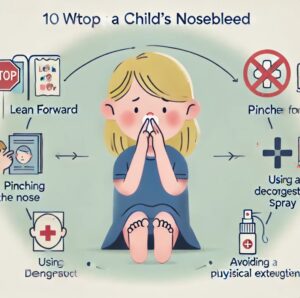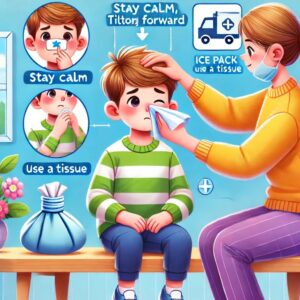Nosebleeds (also known as epistaxis) occur when a blood vessel inside the nose ruptures and blood flows out. Although nosebleeds are common in children, if your child experiences daily nosebleeds, it could be caused by certain factors. Around 60% of people in the United States will experience a nosebleed at some point in their lives, with approximately 6% requiring medical attention.
Common Causes of Daily Nosebleeds
If your child has nosebleeds every day, it could be due to the following reasons:
Dry Air: Cold, dry weather or low indoor humidity can dry out nasal passages, making blood vessels fragile and prone to nosebleeds, especially in winter.
Nasal Injury: Bumps or falls can cause minor trauma to the nose, rupturing blood vessels and leading to nosebleeds. Frequent injuries increase the likelihood of daily nosebleeds.
Nose Picking: Children may pick their nose, causing friction that damages blood vessels and triggers nosebleeds. Repeated picking can lead to daily nosebleeds.
Allergies or Rhinitis: Allergic rhinitis can inflame nasal passages, making blood vessels fragile. Sneezing or blowing the nose frequently can cause nosebleeds.
Medications: Long-term use of nasal sprays or blood-thinning medications can dry out or damage the nasal passages, making it harder for blood to clot and leading to nosebleeds.
When to See a Doctor
If your child experiences daily nosebleeds, especially when there’s no obvious external cause, it’s important to consult a doctor. Seek medical help immediately if:
- The nosebleed lasts longer than 20 minutes and doesn’t stop with basic first aid.
- The nosebleed is the result of a head injury, particularly if the nose or face is deformed or painful.
- The nosebleed persists for several days or recurs frequently, requiring further evaluation.
Preventing Daily Nosebleeds in Children
To reduce the frequency of daily nosebleeds in children, try the following preventive measures:
Keep the Nasal Passages Moisturized: Use a saline nasal spray to keep the nasal passages moist and prevent dryness and crusting.
Avoid Nose Picking: Teach your child not to pick their nose and encourage gentle nose blowing to avoid excessive pressure.
Use a Humidifier: During the winter months, using a humidifier in the home can help maintain indoor humidity levels and prevent nasal dryness.
Apply Ointment: Apply ointments like Vaseline or baby oil inside the nostrils at bedtime to keep the nasal passages moisturized.
Avoid Allergy Triggers: If your child has allergic rhinitis, try to avoid exposure to allergens such as pollen, dust mites, or pet dander.
Avoid Irritating Chemicals: If there are smokers in the household, ensure that your child stays away from secondhand smoke and harmful chemicals.
Case Study: Jack's Daily Nosebleeds
Jack, an 8-year-old boy from the United States, frequently experienced nosebleeds during the winter. His parents noticed that he would have a nosebleed every morning, especially when the weather was cold and dry. Initially, they thought the dry air was the issue, so they started using a humidifier to maintain indoor moisture, but the problem persisted. Jack also tended to blow his nose forcefully at night or unconsciously pick his nose, which seemed to make the situation worse.
When they took Jack to the pediatrician, the doctor diagnosed him with allergic rhinitis. The ongoing allergic reaction was causing inflammation in his nasal passages, making the blood vessels more fragile. The doctor recommended using saline nasal spray to keep his nasal passages moist, minimizing allergen exposure, and educating Jack to blow his nose gently and avoid nose picking. After starting treatment, Jack's nosebleeds reduced significantly. Though dry winter weather still occasionally irritated his nose, the condition was much better controlled with the new preventive measures.
Takeaway
Daily nosebleeds in children can be caused by a variety of factors, including dry air, nasal injury, allergies, and medications. If your child experiences frequent or persistent nosebleeds, it’s important to consult a doctor to identify the underlying cause. With proper care and preventive steps, most cases of daily nosebleeds can be managed effectively.












